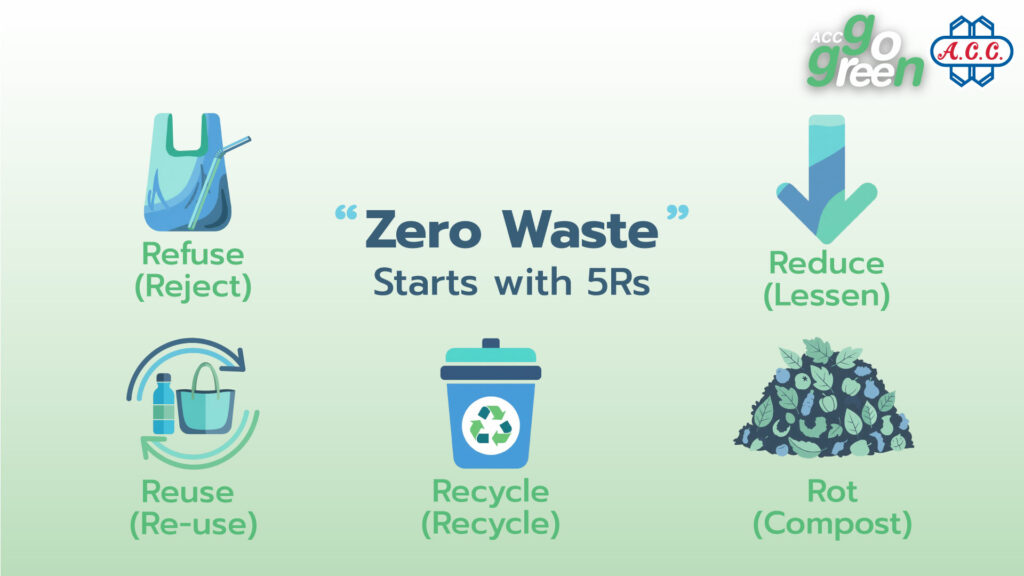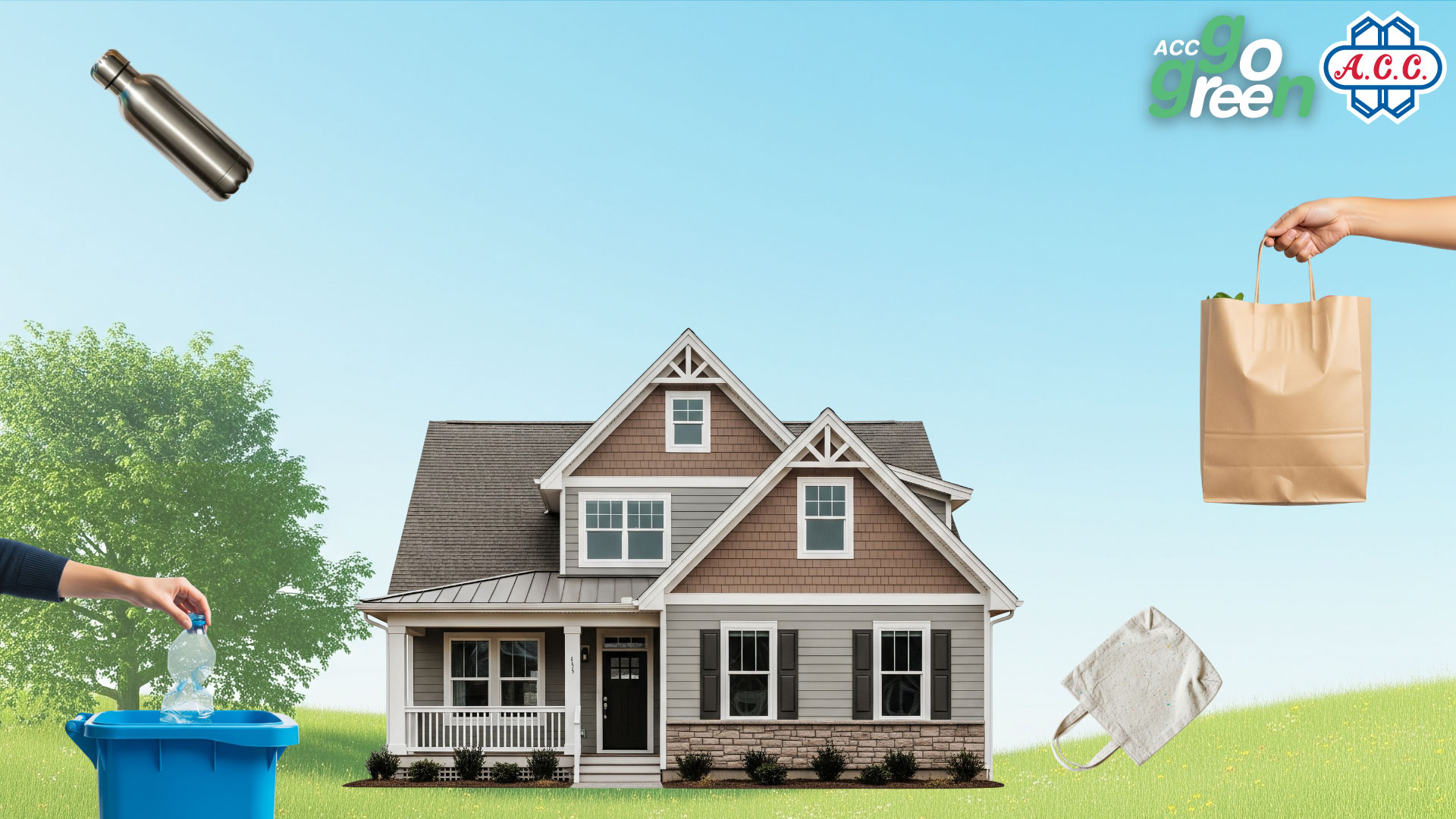In an era where environmental challenges are intensifying, the global waste problem stands as one of the urgent issues we all must collectively address. Reducing the amount of waste we generate daily is no longer just an option; it’s a necessity to protect this planet for sustainability. And for many who perceive waste reduction or adopting a Zero Waste lifestyle as a distant concept, too difficult to truly achieve, this article will prove you wrong!
Embarking on a Zero Waste lifestyle, or minimizing waste, does not mean you have to transform your entire life overnight. Instead, it involves gradually adjusting small daily habits, which can surprisingly create a significant positive impact on our environment. This article will guide you through 5 easy tips that everyone can immediately apply at home, taking a step towards a sustainable Zero Waste lifestyle and contributing to a better environment for all of us.
What is Zero Waste?
Before we delve into waste reduction tips, let’s first understand the concept of Zero Waste. This concept does not imply 100% elimination of waste generation, but rather an utmost effort in designing and managing life so that all resources are reused as much as possible. The goal is to prevent waste from being sent to landfills or incinerated, both of which negatively impact our environment. Adopting a Zero Waste lifestyle is therefore a crucial component in driving sustainability into reality within society.
The principles of Zero Waste are often summarized by the 5Rs: Refuse, Reduce, Reuse, Recycle, and Rot. This framework offers a practical approach to waste reduction at every level. Let’s explore how each principle can be applied in daily life.
 5 Easy Tips for a Zero Waste Lifestyle at Home
5 Easy Tips for a Zero Waste Lifestyle at Home
-
Refuse Unnecessary Items (Refuse)
This is the most powerful first step in waste reduction: refusing things we don’t want or don’t truly need. While it sounds simple, it can be challenging initially due to habit or the thought, “it’s probably not that big a deal.” However, consistent refusal will significantly reduce the amount of waste entering your home.
∘ Refuse plastic bags: Always carry a cloth bag whenever you go shopping. This will significantly reduce the use of plastic bags.
∘ Refuse plastic straws and disposable plastic cups: Choose to carry your own reusable cup or water bottle for drinks, and opt for a stainless steel straw.
∘ Refuse unnecessary freebies or giveaways: Sometimes small free items come with wasteful packaging. If you don’t truly want or think you’ll use them, refusing them from the start helps reduce waste.
∘ Refuse unwanted flyers or documents: If information can be received online, choose that method instead to reduce paper waste.
-
Reduce Consumption (Reduce)
After refusing, reducing the quantity of items we consume and bring into our homes is the next step. Reducing unnecessary purchases. Whether it’s clothing, appliances, or excess food, will contribute to sustainable waste reduction.
∘ Buy only what’s necessary: Before buying anything, always ask yourself, “Do I really need this item?” Sometimes adopting a minimalist lifestyle makes waste reduction easier.
∘ Reduce purchases of over-packaged products: Choose products with minimal packaging or opt for refills to reduce waste from packaging.
∘ Reduce food waste: Plan cooking and portion sizes carefully to reduce food waste. This not only helps reduce resource loss but also saves money.
∘ Reduce resource consumption: “Turn off lights when not in use, unplug electrical appliances, conserve water.” These actions help reduce energy and natural resource consumption, which is part of a green lifestyle.
-
Reuse to Maximize Value (Reuse)
Giving items a second life is the core of a Zero Waste lifestyle. Instead of discarding used items, try to find ways to reuse them for maximum benefit.
∘ Reuse cloth bags and water bottles: This is a simple and effective way to reduce plastic waste.
∘ Reuse food containers: Bring your own food containers to buy food from stores, or use old plastic containers for storage.
∘ Repair items instead of discarding them: If clothes are torn, shoes are damaged, or appliances are broken, consider repairing them before buying new ones. Repairing extends the lifespan of items and greatly reduces waste.
∘ Donate or give away: If you have items you no longer use but are still in good condition, consider donating or passing them on to others who can benefit from them. This prevents them from becoming waste and is also an act of sharing.
-
Recycle Correctly (Recycle)
Even after striving to reduce and reuse, there are still some types of waste that must be discarded. Proper recycling is therefore the final step in responsible waste management.
∘ Understand waste types: Learn which types of waste are recyclable in your area, such as plastic, paper, glass, and metal.
∘ Separate waste correctly: Clean contaminated containers before separating them to prevent contamination of other recyclable waste and ensure efficient recycling processes.
∘ Look for donation/recycling points: Take your sorted waste to the correct collection points to ensure it will truly be recycled properly.
∘ Choose products made from recycled materials: Support the complete recycling loop by choosing products manufactured from recycled materials.
-
Compost (Rot)
Organic waste, such as food scraps, vegetable and fruit peels, or fallen leaves, can also be valuable waste that returns nutrients to nature through composting. Composting is one of the essential principles of Zero Waste and a green lifestyle.
∘ Start composting at home: Use a compost bin or a small compost pile for food scraps and garden waste.
∘ Learn what is compostable: Understand which types of food scraps are suitable for composting and which should not be included.
∘ Utilize the compost: The resulting compost can be used to nourish your garden plants, helping to reduce the need for chemical fertilizers and promoting healthy soil.
Benefits of a Zero Waste Lifestyle: More Than Just Waste Reduction, It’s About Building a Future
Adopting a Zero Waste lifestyle not only helps reduce waste in your home but also positively impacts the environment on a broader scale:
∘ Reduces pollution: Waste reduction helps decrease the amount of waste that needs to be landfilled or incinerated, which are significant causes of air and soil pollution.
∘ Reduces natural resource consumption: Reducing consumption and reusing items lessens the need for producing new goods, which in turn reduces the consumption of natural resources.
∘ Reduces greenhouse gas emissions: Waste reduction and recycling help decrease the energy used in manufacturing and transportation processes, contributing positively to combating global warming.
∘ Creates awareness: Living a Zero Waste lifestyle helps us become aware of the impacts of our consumption and fosters responsibility towards the environment.
 Conclusion:
Conclusion:
Small changes starting with each of us can create a significant impact on the environment and the sustainability of this planet. Waste reduction is therefore one of the crucial steps we can all genuinely take, for a livable world for us and future generations.
Jointly Create a Sustainable World with ACC GO GREEN
At ACC GO GREEN, we believe in the power of every small change to create a better environment and a sustainable future. Supporting a Zero Waste lifestyle and waste reduction is therefore part of the mission we prioritize. We are committed to being a part of driving a green society by providing knowledge and promoting environmentally friendly practices, because our world is a home we must care for together.
Join us in making positive changes with ACC GO GREEN for a bright and sustainable environment for all of us!


